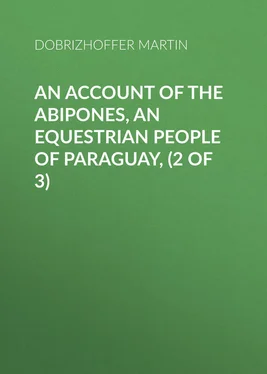Martin Dobrizhoffer - An Account of the Abipones, an Equestrian People of Paraguay, (2 of 3)
Здесь есть возможность читать онлайн «Martin Dobrizhoffer - An Account of the Abipones, an Equestrian People of Paraguay, (2 of 3)» — ознакомительный отрывок электронной книги совершенно бесплатно, а после прочтения отрывка купить полную версию. В некоторых случаях можно слушать аудио, скачать через торрент в формате fb2 и присутствует краткое содержание. Жанр: foreign_antique, foreign_prose, на английском языке. Описание произведения, (предисловие) а так же отзывы посетителей доступны на портале библиотеки ЛибКат.
- Название:An Account of the Abipones, an Equestrian People of Paraguay, (2 of 3)
- Автор:
- Жанр:
- Год:неизвестен
- ISBN:нет данных
- Рейтинг книги:3 / 5. Голосов: 1
-
Избранное:Добавить в избранное
- Отзывы:
-
Ваша оценка:
- 60
- 1
- 2
- 3
- 4
- 5
An Account of the Abipones, an Equestrian People of Paraguay, (2 of 3): краткое содержание, описание и аннотация
Предлагаем к чтению аннотацию, описание, краткое содержание или предисловие (зависит от того, что написал сам автор книги «An Account of the Abipones, an Equestrian People of Paraguay, (2 of 3)»). Если вы не нашли необходимую информацию о книге — напишите в комментариях, мы постараемся отыскать её.
An Account of the Abipones, an Equestrian People of Paraguay, (2 of 3) — читать онлайн ознакомительный отрывок
Ниже представлен текст книги, разбитый по страницам. Система сохранения места последней прочитанной страницы, позволяет с удобством читать онлайн бесплатно книгу «An Account of the Abipones, an Equestrian People of Paraguay, (2 of 3)», без необходимости каждый раз заново искать на чём Вы остановились. Поставьте закладку, и сможете в любой момент перейти на страницу, на которой закончили чтение.
Интервал:
Закладка:
As the jugglers perform the offices not only of soothsayers and physicians, but also of priests of the ceremonies of superstition, it exceeds belief what absurd opinions they inculcate into the ignorant minds of the Abipones. Out of many, I will mention a few. The Abipones think that none of their nation would ever die, were the Spaniards and the jugglers banished from America; for they attribute every one's death, from whatever cause it may proceed, either to the malicious arts of the one, or to the fire-arms of the other. If an Abipon die from being pierced with many wounds, or from having his bones broken, or his strength exhausted by extreme old age, his countrymen all deny that wounds or weakness occasioned his death, and anxiously try to discover by which of the jugglers, and for what reason he was killed. Because they have remembered some of their nation to have lived for a hundred years, they imagine that they would never die, were it not for the jugglers and the Spaniards. What ridiculous ideas do not the Americans entertain respecting the eclipse of the sun and moon! During the time it lasts, the Abipones fill the air with horrid lamentations. They perpetually cry tayretà! oh! the poor little thing! grieving for the sun and moon: for when these planets are obscured, they always fear that they are entirely extinguished. Still more ridiculous are the Chiquito Indians, who say that the sun and moon are cruelly torn by dogs, with which they think that the air abounds, when they see their light fail; attributing their blood red colour to the bites of these animals. Accordingly, to defend their dear planets from those aërial mastiffs, they send a shower of arrows up into the sky, amid loud vociferations, at the time of the eclipse. But, who would believe that the Peruvian Indians, so much more civilized than the rest, should be foolish enough to imagine, that when the sun is obscured, he is angry, and turns away his face from them, on account of certain crimes which they have committed? When the moon is in darkness, they say she is sick, and are in perpetual apprehension, that, when she dies, her immense carcass will fall down upon the earth and crush all the inhabitants. When she recovers her light, they say she has been healed by Pachacámac, the Saviour of the world, who has prevented her death, that the earth may not be utterly crushed and destroyed by her weight. Other crazy notions are entertained by other Americans concerning eclipses. The Abipones call a comet neyàc , the Guaranies yacitatà tatatĩbae , the smoking star: for what we name the hair, beard, or tail of a comet, they take to be smoke. This star is dreaded by all savages, being accounted the forerunner and instrument of various calamities. The Peruvians have always believed the comet to portend the death of their kings, and the destruction of their provinces and kingdoms. Montezuma, monarch of the Mexicans, having frequently beheld a comet like a fiery pyramid, visible from midnight till sun-set, was greatly alarmed for himself and for his people, and shortly after conquered and slain by Cortez.
Let us now return to the superstitions of the Abipones, who think another star, the name of which I have forgotten, portentous, formidable, and destructive. They say that those years in which this star has been seen have always proved bloody and disastrous to their nation. When a whirlwind drives the dust round in a circle, the women throw ashes in its way, that it may be satisfied with that food, and may turn in some other direction. But if the wind rushes into any house with that impetuous whirling, they are certain that one of the inhabitants will die soon. If any live bees be found in the honey-comb, which they bring from the woods, they say that they must be killed out of doors, imagining, that if this be done within the house, they shall never be able to find any more honey.
The Abipones labour under many superstitions, because they abound in jugglers, the teachers of superstition. The most famous at the time that I lived there, were Hanetrâìn, Nahagalkìn, Oaikin, Kaëperlahachin, Pazanoirin, Kaachì, Kepakainkin, Laamamin, and Pariekaikin, the first, and by far the most eminent of them all, who had obtained a high reputation for his prophecies and other peculiarities of his office. Female jugglers abound to such a degree, that they almost out-number the gnats of Egypt. Their chief endeavour is to inspire their countrymen with a veneration for their grandfather, the evil spirit. On this subject I shall now proceed to discourse.
CHAPTER X.
CONJECTURES WHY THE ABIPONES TAKE THE EVIL SPIRIT FOR THEIR GRANDFATHER, AND THE PLEIADES FOR THE REPRESENTATION OF HIM
When you read that the Abipones take the devil for their grandfather, you may laugh with me at their folly, and behold their madness with pity and wonder, but, if you be wise, let all this be done in moderation, for still grosser errors have been entertained amongst many nations civilized by laws and arts both human and divine. If you do but look into history sacred or profane, you will allow that there is scarce any thing to which divine honours have not formerly been paid. Such madness and folly in many polished nations should so exhaust our indignation and wonder as to make us judge mildly of the savage Abipones, educated amongst wild beasts, and unacquainted with letters, if they simply dignify the evil spirit with the title of their grandfather, without giving him the name or honours of a divinity. During a seven-years' residence amongst the savages, I never discovered any thing of that nature. If secretly or in our absence they did any thing which a divine would condemn, I think it proceeded from no religious inclination towards the evil spirit, but only from fear of him, and from the compulsion used by the jugglers; so that they rather merit the imputation of stupidity than of blasphemy.
Not only the Abipones, but likewise the Mocobios, Tobas, Yapitalakas, Guaycurus and other equestrian people of Chaco, boast themselves grandsons of the evil spirit, partakers no less of their superstition than of their madness. But how different are the opinions entertained by the southern equestrian tribes, who wander up and down the region of Magellan! They are all acquainted with the devil, whom they call Balichù. They believe that there is an innumerable crowd of demons, the chief of whom they name El El, and all the inferior ones Quezubû. They think, however, every kind of demon hostile and mischievous to the human race, and the origin of all evil, regarding them in consequence with dread and abhorrence. The Puelches, Picunches, or Moluches, are unacquainted even with the name of God. These last ascribe all the good things they either possess or desire to the sun, and to the sun they pray for them. When a priest of our order told them that God, the creator of all things, and amongst the rest of the sun, should be worshipped before the work of his own hands, they replied; "Till this hour, we never knew nor acknowledged any thing greater or better than the sun." The Patagonians call God Soychù, to wit, that which cannot be seen, which is worthy of all veneration, and which does not live in the world; hence they call the dead Soychuhèt , men that dwell with God beyond the world. They seem to hold two principles in common with the Gnostics and Manichæans, for they say that God created both good and evil demons. The latter they greatly fear, but never worship. They believe every sick person to be possessed of an evil demon; hence their physicians always carry a drum with figures of devils painted on it, which they strike at the beds of sick persons, to drive the evil demon, which causes the disorder, from the body. The savages of Chili are ignorant of the name and worship of God, but believe in a certain aërial spirit, called Pillan, to whom they address supplications that he will scatter their enemies, and thanksgiving, amidst their cups, after gaining a victory. Pillan is also their name for thunder, and they worship this deity chiefly when it thunders. The devil, which they call Alveè, they detest with their whole hearts. Hence, as they think life the best of all things, when any of them dies, they say that the evil spirit has taken him away. The Brazilians and Guaranies call the devil Aña, or Añanga, and fear him on account of a thousand noxious arts by which he is signalized. In Virginia, the savages call the devil Okè, and pay him divine honours. Since numerous and neighbouring savages regard the devil with fear and contempt, I cannot imagine why the Abipones give him the affectionate and honourable appellation of their grandfather. But there is no need of reason and argument to induce the savages to embrace the absurdest opinions, and to take what is doubtful for certain, what is false for perfectly true. The lies of a crafty juggler, the dreams of a foolish old woman, listened to with attentive ears, are more than enough to make them swear that the devil is their grandfather, or any thing still more absurd.
Читать дальшеИнтервал:
Закладка:
Похожие книги на «An Account of the Abipones, an Equestrian People of Paraguay, (2 of 3)»
Представляем Вашему вниманию похожие книги на «An Account of the Abipones, an Equestrian People of Paraguay, (2 of 3)» списком для выбора. Мы отобрали схожую по названию и смыслу литературу в надежде предоставить читателям больше вариантов отыскать новые, интересные, ещё непрочитанные произведения.
Обсуждение, отзывы о книге «An Account of the Abipones, an Equestrian People of Paraguay, (2 of 3)» и просто собственные мнения читателей. Оставьте ваши комментарии, напишите, что Вы думаете о произведении, его смысле или главных героях. Укажите что конкретно понравилось, а что нет, и почему Вы так считаете.












